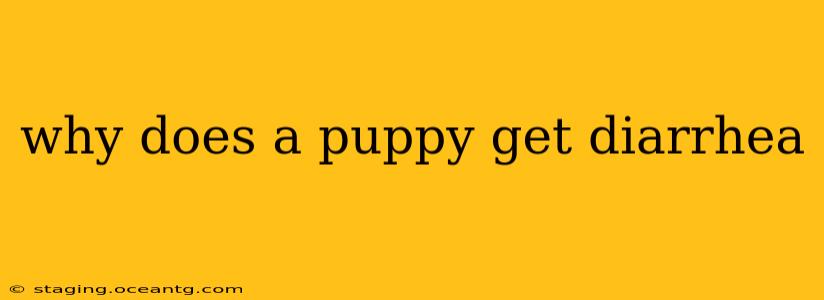Why Does a Puppy Get Diarrhea? A Comprehensive Guide for Concerned Owners
Diarrhea in puppies is a common concern for pet owners, often causing worry and sleepless nights. Understanding the causes can help you address the problem quickly and effectively. While this information is for educational purposes, always consult your veterinarian for a proper diagnosis and treatment plan for your puppy. They can assess your individual puppy's needs and recommend the best course of action.
What are the common causes of puppy diarrhea?
Puppy diarrhea stems from various factors, ranging from dietary indiscretions to more serious underlying medical conditions. Let's explore some of the most frequent culprits:
-
Dietary indiscretions: This is arguably the most common reason. Puppies are notorious for scavenging and eating things they shouldn't, like garbage, spoiled food, or even non-food items. A sudden change in diet, introducing new foods too quickly, or feeding low-quality food can also trigger diarrhea. The introduction of table scraps, even seemingly harmless ones, can upset their sensitive digestive systems.
-
Infections: Viral, bacterial, and parasitic infections are significant causes. Parvovirus, for instance, is a highly contagious and potentially fatal viral infection that causes severe diarrhea, vomiting, and lethargy. Other infections can be less severe but still require veterinary attention. Worms and other parasites are also common culprits, particularly in puppies that haven't received appropriate preventative medication.
-
Stress: Just like humans, puppies can experience stress-induced diarrhea. Changes in environment, new family members, travel, or even loud noises can disrupt their digestive system.
-
Food allergies or intolerances: Certain ingredients in commercial dog food or even human food can trigger allergic reactions in some puppies, leading to diarrhea and other symptoms. Common allergens include dairy, wheat, soy, and beef.
-
Pancreatitis: This is an inflammation of the pancreas, a crucial organ in digestion. It can cause severe diarrhea, vomiting, and abdominal pain.
-
Inflammatory bowel disease (IBD): This chronic condition affects the digestive tract, leading to persistent diarrhea, vomiting, and weight loss.
What are the signs of puppy diarrhea besides loose stools?
While loose or watery stools are the most obvious sign, other symptoms can accompany puppy diarrhea, providing clues about the underlying cause:
- Lethargy: A puppy with diarrhea may seem unusually tired and inactive.
- Vomiting: This often occurs alongside diarrhea, particularly with viral or bacterial infections.
- Loss of appetite: Diarrhea can lead to a decrease in appetite and potential weight loss.
- Dehydration: Severe diarrhea can cause dehydration, characterized by sunken eyes, dry gums, and lethargy. Dehydration is a serious concern and requires immediate veterinary attention.
- Blood in the stool: The presence of blood in the stool indicates a more serious problem and warrants immediate veterinary intervention.
- Mucus in the stool: This can also signify underlying issues such as intestinal inflammation.
When should I take my puppy to the vet for diarrhea?
Don't hesitate to contact your veterinarian if your puppy's diarrhea persists for more than 24 hours, is accompanied by other symptoms like vomiting or lethargy, or shows signs of dehydration. Immediate veterinary care is crucial if you notice blood or mucus in the stool. Early intervention is key to preventing complications and ensuring your puppy's health.
How can I prevent puppy diarrhea?
Prevention is always better than cure. Here are some proactive measures you can take:
- Feed a high-quality puppy food: Choose a food formulated specifically for puppies, containing appropriate levels of nutrients.
- Avoid table scraps: Stick to your puppy's prescribed diet and avoid giving them human food.
- Ensure access to clean water: Always provide fresh, clean water.
- Practice good hygiene: Wash your hands thoroughly after handling your puppy or their waste.
- Keep your puppy's environment clean: Regularly clean and disinfect your puppy's living space.
- Administer appropriate parasite preventative medication: Follow your vet's recommendations for deworming and flea/tick prevention.
Remember, this information is for general knowledge and doesn't replace professional veterinary advice. Always consult your veterinarian for diagnosis and treatment of your puppy's diarrhea. Early intervention is crucial for a swift and complete recovery.
